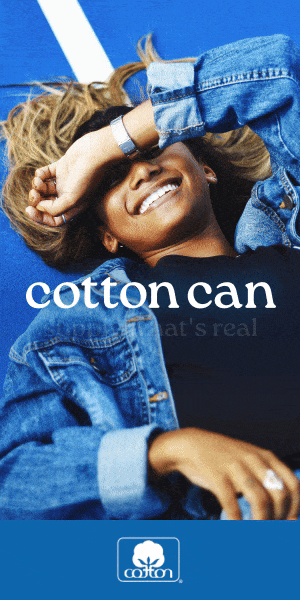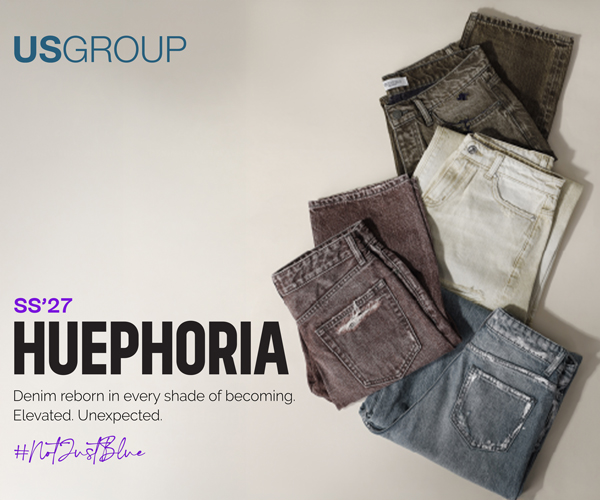Factory Talk: Denim production reimagined

Originally a spinning and weaving company, it’s 35 years since Orta began manufacturing denim and ten years since it launched Orta Blu, its own sustainability division. The 2020s promise no let-up in the Turkish producer’s commitment to making its footprint lighter and its “handprint” (what it gives back to the planet) stronger.
Turkish denim producer Orta is proud of progress it has made in lowering the environmental footprint of its production processes. So much so that it has compiled detailed data from a lifecycle assessment (LCA) analysis it has carried out on its range of fabrics and is sharing the information as widely as it can. Swing-tags bearing a QR (quick-response) code are available, which, at the flash of a scanner, will reveal details of the water consumption, land use and overall carbon footprint, comparing the figures with those of standard denim.
It runs two mills and a dyehouse at its headquarters in Kayseri. The dyehouse has its own wastewater treatment plant. Standards are high, Orta says, because that’s what the authorities in this part of Turkey, Central Anatolia, insist on. More than this, though, high standards are in keeping with the company’s own ambitions. It aims, for example, to go plastic free in its mills, its corporate headquarters and its showrooms. It is intent on using its technical know-how to make 75% of its denim fabric self-cleaning, employing advanced technology to make the fabric cleanable by ultraviolet rather than water. It has also developed a dyeing process, Indigo Flow, that saves 55% of water during production. Orta intends to use Indigo Flow in 100% of its dyeing operations and to reduce its overall consumption of water by half.
As well as focusing on its footprint, the company says it also has a mission to improve its ‘handprint’, which it defines as what it is doing to give back to the planet. It says it wants to “reinvent” manufacturing processes, to show high levels of concern for ethics as well as aesthetics, to celebrate artisan skills and to “make jeans matter” for future generations. It calls this entire programme of improvements Orta Blu and says this is now central to everything it does.
While welcoming these sustainability developments, the company’s big-name global jeans brand customers are hard to persuade to increase what they are willing to pay per metre to help fund this progress, which is the result of substantial investment that the firm makes in its research and development department. Sales manager Murat Sözeri says that the global industry collectively produces 10 billion metres of denim fabric per year. While most if not all producers claim to be sustainable, Orta provides concrete information that backs up the company’s claims that can help set it apart from the rest.
Orta’s attempts to do this include engaging with GOTS (the Global Organic Textile Standard), and the Better Cotton Initiative (BCI), which campaigns to encourage clothing brands to make the most sustainable choices they can when sourcing cotton, including fair-trade and organic cotton. In addition, Mr Sözeri points out that Orta is one of only two mills in Turkey to have begun to engage with environmental and social performance management tool the Higg Index. He says working with third-party organisations will help the company prove that it is what it says it is and does what it says it does.
A sustainability specialist at the company, Sebla Önder, says Indigo Flow is one of biggest changes the company has brought in as part of its improvement programme. This proprietary process is, she says, “the cleanest and most sustainable method of indigo dyeing possible”. The company developed it in 2016 and in the first two years since its launch Orta saved 20 million litres of water. Ms Önder says the water savings from Indigo Flow can increase further and that a reduction of 70% of the volume of water it previously needed to produce its denim fabric is possible.
An internal energy management team has been in operation at the company since 2015, finding and implementing energy-efficient processes to reduce carbon emissions. Its production facilities have obtained ISO 50001 energy management system certification and between 2016 and 2018 Orta saved around 18 million gigawatts of energy.
Another important change Ms Önder points to is their efforts to promote the Biodesign Challenge (BDC), an international competition and education programme that launched in 2016 to bring design school students together with scientists and industry experts to help them create new products and services “inspired by biology”. More than 500 students from all over the world have taken part in this challenge so far and in 2019, for the first time, the company became a sponsor of the competition and attached its name to one of nine prizes, The Orta Prize for Bioinspired Textile Processes.
Last June, a total of 37 teams from universities and colleges around the world gathered at the Museum of Modern Art and Parsons School of Design in New York for the BDC Summit. A team of students from RMIT University in Melbourne, Australia, were the inaugural winners of the Orta Prize. Their bio-inspired textile process innovation is Enzer, a filtration system that can be retrofitted to domestic washing machines. It uses filters to catch particles released from clothing during the laundry cycle. These particles then come into contact with a powder that breaks the fibres down using enzymes from the Ideonella sakaiensis bacterium.
“We challenged these students to change the sustainability narrative of denim,” Sebla Önder says. “Rather than address energy or water savings, this collaboration has been more about changing our mindset with regard to production processes. Rising consumption around the world is causing a waste crisis and this is challenging Orta to reimagine denim.”













